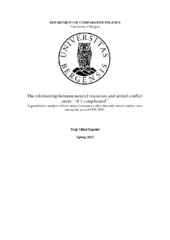The relationship between natural resources and armed conflict onset:"It's complicated". A quantitative analysis of how natural resources affect internal armed conflict onset during the period 1950-2003
Master thesis
Permanent lenke
https://hdl.handle.net/1956/6023Utgivelsesdato
2012-05-31Metadata
Vis full innførselSamlinger
Sammendrag
The thesis examines how natural resources affect internal armed conflict onset through a quantitative analysis of data on 167 countries covering the period 1950-2003. Previous research on the relationship between natural resources and armed conflict has often not focused thoroughly on explanations. This thesis seeks to rectify this by focusing on classifying natural resources, and by focusing on the purported mechanisms that are argued to link natural resources and armed conflict onset, namely those focusing on the state, and those focusing on rebels and their motivations and opportunities. This is done through a random-effects panel data model, as well as a novel hybrid approach" combining some of the previously aspects of the previous dominant fixed -and random effects models. The thesis' central findings are that classifying natural resources is vital in understanding how they affect armed conflict onset. Among the included natural resource measures, oil, drugs and diamonds, drugs and diamonds are in part found to affect armed conflict onset. Furthermore, the thesis gives support to the notion of natural resources mainly affecting armed conflict onset through their effect on the state and its institutions. The thesis implies that research on natural resources and internal armed conflict onset, as well as policies directed at hindering armed conflict onset, perhaps should focus more on state institutions than have previously been the case.
Utgiver
The University of BergenOpphavsrett
Copyright the author. All rights reservedBeslektede innførsler
Viser innførsler beslektet ved tittel, forfatter og emneord.
-
What we don´t measure about human resources: towards a conceptual framework for analysing the role of soft variables in human resources management modelling
Tabacaru, Mihaela (Master thesis, 2007)Low retention of valuable employees and difficulties in finding qualified candidates for recruitmentare two issues managers face in Romania, but are a growing concern around the world (Deloitte,2004; Holton & Naquin, 2004). ... -
Digital Pedagogy, New Media Literacies and Open Educational Resources. Exploring the Impact of Digital Resources in Higher Education.
Bahrawy, Nicholas Winsents (Master thesis, 2019-11-20) -
A resource-based view of green innovation as a strategic firm resource: Present status and future directions
Khanra, Sayantan; Kaur, Puneet; Joseph, Rojers P; Malik, Ashish; Dhir, Amandeep (Journal article; Peer reviewed, 2021)Green innovation could become a valuable firm resource for establishing competitive advantage while simultaneously contributing towards sustainable development; in other words, green innovation has the potential to address ...
